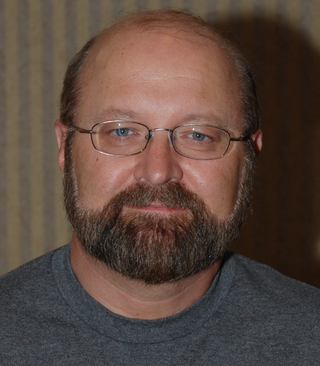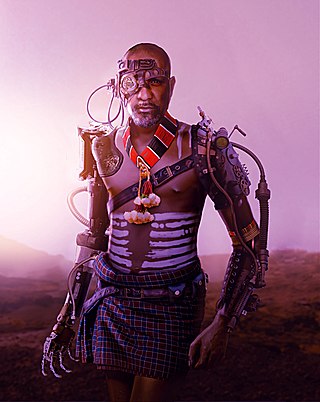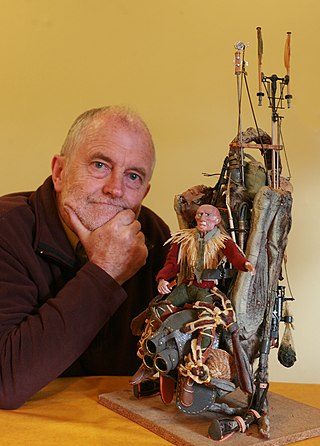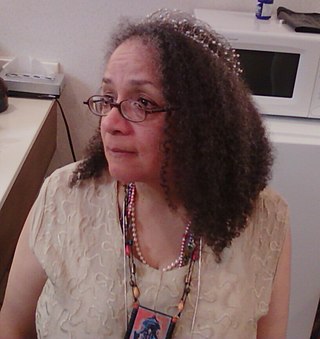Reading for the Future (RFF) is an international group which encourages literacy and reading through the use of speculative fiction. Some regional groups collect new and used books which are then distributed free of charge to schools and libraries. For many rural schools, this is the only way they get new books.
RFF does not have a central organization but is rather a series of grassroots groups. Developing the Young Reader (DYR) associated with RFF in April 2000. Reading for the Future does have a Web site filled with resources for educators, librarians, home schoolers and parents (website).
Regional groups are listed alphabetically. If webpages are known, they are linked.

Revolt in 2100 is a 1953 science fiction collection by American writer Robert A. Heinlein, part of his Future History series.

The Handmaid's Tale is a futuristic dystopian novel by Canadian author Margaret Atwood and published in 1985. It is set in a near-future New England in a patriarchal, totalitarian theonomic state known as the Republic of Gilead, which has overthrown the United States government. Offred is the central character and narrator and one of the "handmaids", women who are forcibly assigned to produce children for the "commanders", who are the ruling class in Gilead.

Tracy Raye Hickman is an American fantasy author. He wrote the Dragonlance novels with Margaret Weis. He also wrote role playing game material while working for TSR and has cowritten novels with his wife, Laura Hickman. He is the author or co-author of over 60 books.

John David Wolverton, better known by his pen names Dave Wolverton and David Farland, was an American author, editor, and instructor of online writing workshops and groups. He wrote in several genres but was known best for his science fiction and fantasy works. Books in his Runelords series hit the New York Times bestsellers list.

Jack Dann is an American writer best known for his science fiction, as well as an editor and a writing teacher, who has lived in Australia since 1994. He has published over seventy books, the majority being as editor or co-editor of story anthologies in the science fiction, fantasy and horror genres. He has published nine novels, numerous shorter works of fiction, essays, and poetry, and his books have been translated into thirteen languages. His work, which includes fiction in the science fiction, fantasy, horror, magical realism, and historical and alternative history genres, has been compared to Jorge Luis Borges, Roald Dahl, Lewis Carroll, J. G. Ballard, and Philip K. Dick.

Afrofuturism is a cultural aesthetic, philosophy of science, and history that explores the intersection of the African diaspora culture with science and technology. It addresses themes and concerns of the African diaspora through technoculture and speculative fiction, encompassing a range of media and artists with a shared interest in envisioning black futures that stem from Afro-diasporic experiences. While Afrofuturism is most commonly associated with science fiction, it can also encompass other speculative genres such as fantasy, alternate history, and magic realism. The term was coined by Mark Dery, an American Cultural critic in 1993 and explored in the late 1990s through conversations led by Alondra Nelson.

Dougal Dixon is a Scottish geologist, palaeontologist, educator and author. Dixon has written well over a hundred books on geology and palaeontology, many of them for children, which have been credited with attracting many to the study of the prehistoric animals. Because of his work as a prolific science writer, he has also served as a consultant on dinosaur programmes.
Brian Evenson is an American academic and writer of both literary fiction and popular fiction, some of the latter being published under B. K. Evenson. His fiction is often described as literary minimalism, but also draws inspiration from horror, weird fiction, detective fiction, science fiction and continental philosophy. Evenson makes frequent use of dark humor and often features characters struggling with the limits and consequences of knowledge. He has also written non-fiction, and translated several books by French-language writers into English.

Conduit, often stylized as CONduit, was an annual general interest science fiction and fantasy convention held in May in Salt Lake City, Utah. CONduit was founded in 1989 but took two years to plan its first convention. While there are other genre conventions in Utah, CONduit was the largest general interest convention, and provided a means for professionals to meet and network with other professionals, as well as a way for fans to meet and enjoy each other's company.

Divide and Rule is a 1948 collection of two science fiction novellas by American writer L. Sprague de Camp, first published in hardcover by Fantasy Press, and later reissued in paperback by Lancer Books in 1964. The collected pieces were previously published in 1939 and 1941 in the magazines Unknown and Astounding. The first stand-alone edition of the title story was published as a large-print hardcover by Thorndike Press in September 2003. An E-book edition of the title story was issued by Gollancz's SF Gateway imprint on September 29, 2011 as part of a general release of de Camp's works in electronic form.

Resources for the Future (RFF) is an American nonprofit organization, founded in 1952 that conducts independent research into environmental, energy, and natural resource issues, primarily via economics and other social sciences. Headquartered in Washington, D.C., RFF performs research around the world.

Nisi Shawl is an African-American writer, editor, and journalist. They are best known as an author of science fiction and fantasy short stories who writes and teaches about how fantastic fiction might reflect real-world diversity of gender, sexual orientation, race, colonialism, physical ability, age, and other sociocultural factors.

Black science fiction or black speculative fiction is an umbrella term that covers a variety of activities within the science fiction, fantasy, and horror genres where people of the African diaspora take part or are depicted. Some of its defining characteristics include a critique of the social structures leading to black oppression paired with an investment in social change. Black science fiction is "fed by technology but not led by it." This means that black science fiction often explores with human engagement with technology instead of technology as an innate good.
RFF may refer to:
Dark Matter is an anthology series of science fiction, fantasy, and horror stories and essays produced by people of African descent. The editor of the series is Sheree Thomas. The first book in the series, Dark Matter: A Century of Speculative Fiction from the African Diaspora (2000), won the 2001 World Fantasy Award for Best Anthology. The second book in the Dark Matter series, Dark Matter: Reading the Bones (2004), won the World Fantasy Award for Best Anthology in 2005. A forthcoming third book in the series is tentatively named Dark Matter: Africa Rising. This was finally published at the end of 2022 under the title Africa Risen: A New Era of Speculative Fiction, from Tor Books.

"Divide and Rule" is a science fiction novella by American writer L. Sprague de Camp. It was first published as a serial in the magazine Unknown from April to May, 1939 and first appeared in book form in de Camp's collection Divide and Rule. The story was revised for book publication. The first stand-alone book edition of the story was published as a large-print hardcover by Thorndike Press in September 2003. An E-book edition of the story was issued by Gollancz's SF Gateway imprint on September 29, 2011 as part of a general release of de Camp's works in electronic form.
Design fiction is a design practice aiming at exploring and criticising possible futures by creating speculative, and often provocative, scenarios narrated through designed artifacts. It is a way to facilitate and foster debates, as explained by futurist Scott Smith: "... design fiction as a communication and social object creates interactions and dialogues around futures that were missing before. It helps make it real enough for people that you can have a meaningful conversation with".

Speculative evolution is a genre of speculative fiction and an artistic movement focused on hypothetical scenarios in the evolution of life, and a significant form of fictional biology. It is also known as speculative biology and it is referred to as speculative zoology in regards to hypothetical animals. Works incorporating speculative evolution may have entirely conceptual species that evolve on a planet other than Earth, or they may be an alternate history focused on an alternate evolution of terrestrial life. Speculative evolution is often considered hard science fiction because of its strong connection to and basis in science, particularly biology.

Charlie Nicholes Holmberg is an American fantasy author best known for The Paper Magician series. She is from Salt Lake City, Utah, and graduated from Brigham Young University with a bachelor's degree in English in 2010. Her first novel, The Paper Magician, was released in 2014. Holmberg expanded the book into a series, the film rights for which were purchased by Disney in 2016. In addition to her other book series, Holmberg has published five standalone novels. One of these, The Fifth Doll, won the 2017 Whitney Award for Speculative Fiction. Many of her other works have been nominated for literary awards as well. In addition to writing, Holmberg cohosts the podcast Your Mom Writes Books.

Brian Lee Durfee is an American wildlife, landscape, and fantasy painter, and a fantasy and horror writer. His paintings have appeared in various genre and other magazines, games, and books. One of his wildlife paintings is in the permanent collection at the Grand Canyon National Park visitors center.